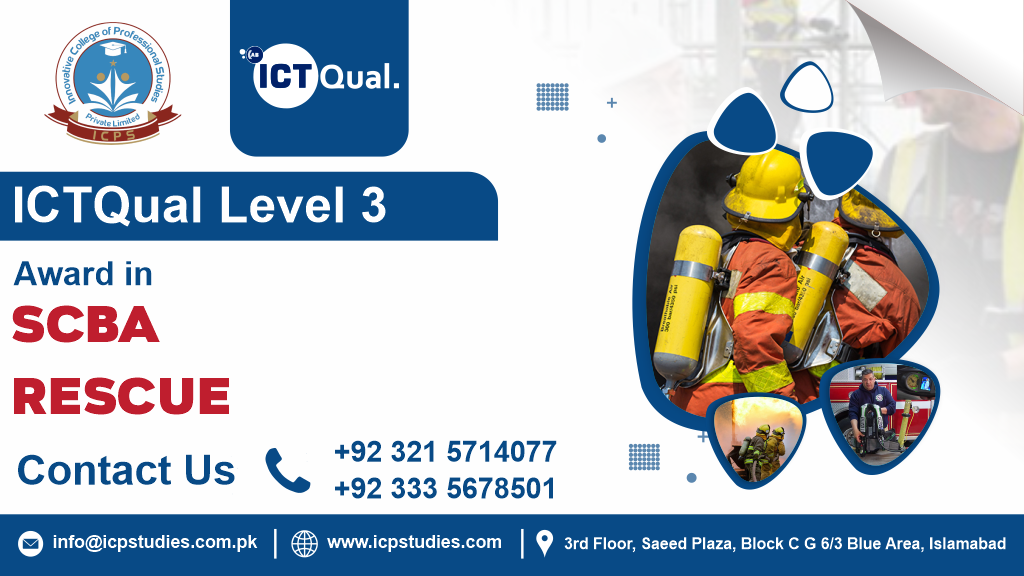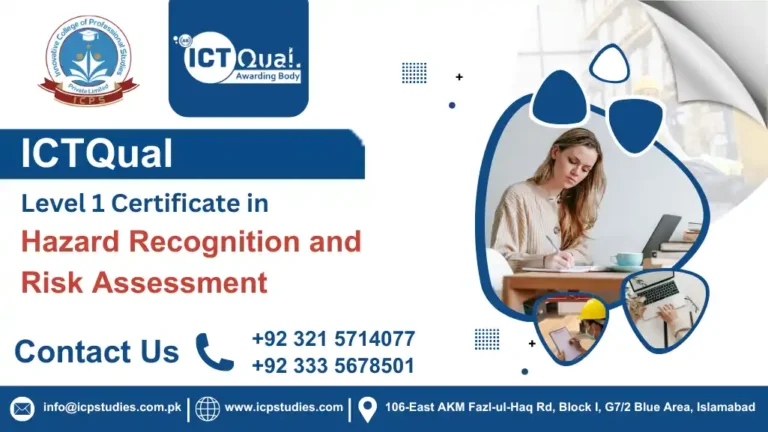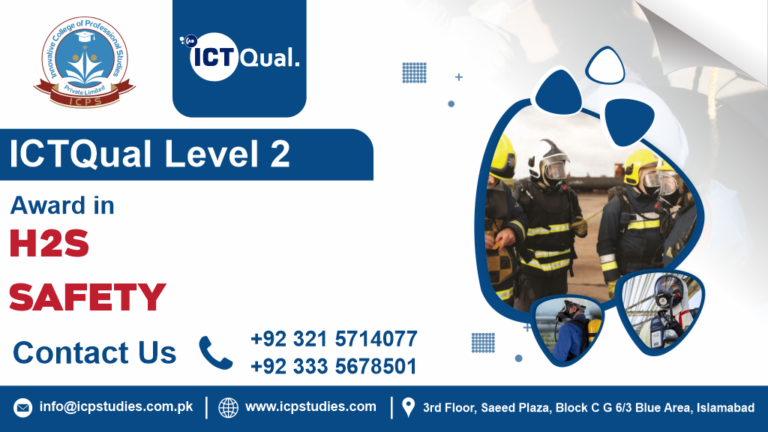In environments where safety is paramount and the risks are high, mastering the use of Self-Contained Breathing Apparatus (SCBA) is essential. The Level 3 Award in SCBA Rescue is a specialized qualification designed to equip individuals with the advanced skills needed to effectively use SCBA in emergency situations, ensuring both their own safety and that of others. If you’re involved in emergency response, firefighting, or any role that requires SCBA, here’s why this award is crucial for your professional development.
The Level 3 Award in SCBA Rescue is a comprehensive qualification aimed at providing individuals with the knowledge and skills to operate SCBA equipment safely and effectively during rescue operations. SCBA units are vital in environments where breathable air is compromised, such as in fires, hazardous material incidents, or confined spaces. This qualification covers both the theoretical and practical aspects of using SCBA, focusing on rescue techniques and safety protocols.
The Level 3 Award in SCBA Rescue is more than just a qualification; it’s a critical investment in your ability to perform safely and effectively in high-risk environments. By mastering SCBA use and rescue techniques, you enhance your safety, compliance with regulations, and overall effectiveness in emergency situations. Whether you’re an emergency responder, industrial safety professional, or part of a rescue team, this award provides the advanced skills necessary to excel in your role and ensure the highest standards of safety.
All About ICTQual Level 3 Award In SCBA Rescue
Course Overview
The Level 3 Award in SCBA Rescue is an advanced qualification designed to provide individuals with comprehensive training in the use of Self-Contained Breathing Apparatus (SCBA) for rescue operations. SCBA is critical in environments where breathable air is compromised due to smoke, toxic gases, or low oxygen levels. This award focuses on the skills and knowledge required to operate SCBA safely and effectively in high-risk scenarios.
Level 3 Award in SCBA Rescue is a crucial qualification for professionals working in high-risk environments. It provides the advanced knowledge and skills necessary to use SCBA effectively, conduct safe and efficient rescues, and adhere to regulatory standards.
Study Units
- Advanced SCBA Equipment and Technology
- Complex Emergency Scenario Management
- Risk Assessment and Management
- Leadership and Team Coordination
- Practical Rescue Techniques
- Legal and Ethical Considerations
- Health and Safety Protocols
To enroll in the ICTQual Level 3 Award in SCBA (Self-Contained Breathing Apparatus) Rescue, participants typically need to meet the following requirements:
- Age Requirement: Participants should be at least 18 years old.
- Basic Literacy and Numeracy: A good understanding of English is essential for completing the course materials and assessments.
- Physical Fitness: Participants should be in good physical condition to perform practical rescue tasks that involve SCBA.
- Relevant Experience: Prior experience in emergency services, firefighting, or related fields is beneficial.
- Medical Fitness: Participants may need to provide evidence of medical fitness to use SCBA equipment.
- Course Registration: Participants must register for the course through an accredited training provider.
- Payment: Course fees must be paid as required by the training provider.
- Commitment to Attend: Participants should be prepared to attend the full duration of the course and complete any required assessments to receive certification.
The ICTQual Level 3 Award in SCBA (Self-Contained Breathing Apparatus) Rescue is designed for:
- Firefighters: Individuals involved in firefighting who need to perform rescues in hazardous environments.
- Emergency Responders: Personnel responding to emergencies that require the use of breathing apparatus for rescue operations.
- Hazardous Materials (HAZMAT) Teams: Members who may encounter toxic environments and need to perform rescues safely.
- Rescue Operatives: Individuals working in rescue operations where SCBA is required to ensure safety.
- Health and Safety Professionals: Those responsible for training and safety protocols related to SCBA use.
- Industrial Workers: Employees in industries where emergency rescue scenarios may require the use of breathing apparatus.
This course equips participants with the knowledge and skills necessary to safely and effectively use SCBA during rescue operations in various hazardous situations.
4o mini
Learning Outcome
Advanced SCBA Equipment and Technology
Learning Outcomes:
- Component Identification: Recognize and describe the components and technological advancements of modern SCBA systems, including air supply, mask, and communication systems.
- Operational Proficiency: Demonstrate advanced operational techniques for using SCBA equipment in various emergency scenarios, including high-stress and low-visibility environments.
- Maintenance and Troubleshooting: Perform routine maintenance, inspections, and troubleshooting of SCBA equipment to ensure functionality and safety.
- Technological Integration: Understand the integration of SCBA with other emergency response technologies and systems, such as communication devices and thermal imaging cameras.
2. Complex Emergency Scenario Management
Learning Outcomes:
- Scenario Analysis: Analyze and manage complex emergency scenarios where SCBA is required, including structural fires, hazardous material incidents, and confined space rescues.
- Response Strategies: Develop and implement effective response strategies and tactics for managing multiple hazards and dynamic situations during rescue operations.
- Decision-Making: Make informed decisions under pressure, considering the unique challenges and variables of complex emergencies.
- Coordination: Coordinate with other emergency services and teams to ensure a cohesive and effective response to multifaceted scenarios.
3. Risk Assessment and Management
Learning Outcomes:
- Hazard Identification: Identify and evaluate potential hazards associated with SCBA use and rescue operations, such as toxic atmospheres, fire hazards, and structural instability.
- Risk Assessment: Conduct comprehensive risk assessments to determine the severity and likelihood of identified hazards and their impact on safety.
- Control Measures: Implement and manage control measures to mitigate identified risks, ensuring a safe working environment during rescue operations.
- Continuous Evaluation: Continuously evaluate and adjust risk management strategies based on evolving conditions and new information.
4. Leadership and Team Coordination
Learning Outcomes:
- Leadership Skills: Develop and apply leadership skills to guide and support teams during rescue operations, ensuring effective communication and decision-making.
- Team Coordination: Coordinate team efforts and resources effectively, assigning roles and responsibilities to maximize efficiency and safety.
- Conflict Resolution: Address and resolve conflicts or issues within the team to maintain a cohesive and focused approach to rescue operations.
- Performance Evaluation: Assess and provide feedback on team performance, identifying areas for improvement and implementing strategies to enhance teamwork and effectiveness.
5. Practical Rescue Techniques
Learning Outcomes:
- Rescue Procedures: Master practical rescue techniques, including the safe use of SCBA in confined spaces, hazardous environments, and during high-risk operations.
- Simulation Training: Apply learned techniques in simulated rescue scenarios to practice and refine skills in a controlled environment.
- Safety Protocols: Adhere to safety protocols and procedures during practical exercises to ensure the safety of both rescuers and those being rescued.
- Emergency Adaptability: Demonstrate adaptability and problem-solving skills during practical exercises, addressing unexpected challenges and evolving scenarios.
6. Legal and Ethical Considerations
Learning Outcomes:
- Legal Requirements: Understand and comply with legal requirements and regulations related to SCBA use, rescue operations, and emergency response.
- Ethical Standards: Apply ethical standards in decision-making and conduct during rescue operations, ensuring integrity and professionalism.
- Documentation and Reporting: Maintain accurate records and documentation related to SCBA use, incidents, and rescue operations for legal and organizational purposes.
- Rights and Responsibilities: Recognize the rights and responsibilities of all parties involved in rescue operations, including compliance with workplace and safety laws.
7. Health and Safety Protocols
Learning Outcomes:
- Health and Safety Standards: Understand and implement health and safety standards relevant to SCBA use and rescue operations.
- Personal Protection: Ensure the proper use of personal protective equipment (PPE) and adherence to health and safety guidelines to minimize risks.
- Emergency Procedures: Follow established emergency procedures and protocols to manage and respond to health and safety incidents effectively.
- Well-being Monitoring: Monitor and assess the health and well-being of team members during and after rescue operations to prevent health issues related to SCBA use and high-stress environments.
FAQs about ICTQual Level 3 Award In SCBA Rescue







